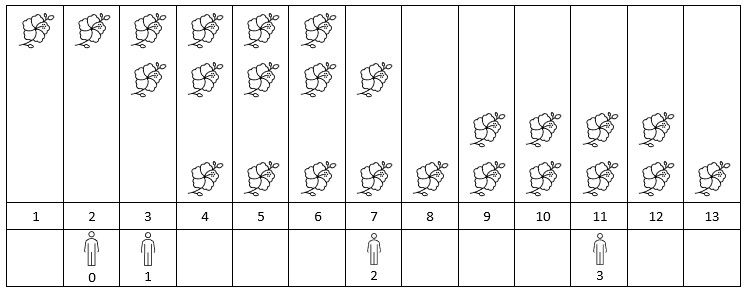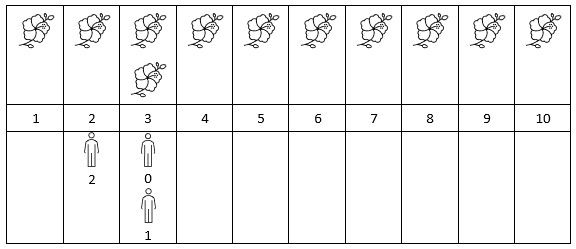同步操作将从 doocs/leetcode 强制同步,此操作会覆盖自 Fork 仓库以来所做的任何修改,且无法恢复!!!
确定后同步将在后台操作,完成时将刷新页面,请耐心等待。
给你一个下标从 0 开始的二维整数数组 flowers ,其中 flowers[i] = [starti, endi] 表示第 i 朵花的 花期 从 starti 到 endi (都 包含)。同时给你一个下标从 0 开始大小为 n 的整数数组 people ,people[i] 是第 i 个人来看花的时间。
请你返回一个大小为 n 的整数数组 answer ,其中 answer[i]是第 i 个人到达时在花期内花的 数目 。
示例 1:

输入:flowers = [[1,6],[3,7],[9,12],[4,13]], people = [2,3,7,11] 输出:[1,2,2,2] 解释:上图展示了每朵花的花期时间,和每个人的到达时间。 对每个人,我们返回他们到达时在花期内花的数目。
示例 2:

输入:flowers = [[1,10],[3,3]], people = [3,3,2] 输出:[2,2,1] 解释:上图展示了每朵花的花期时间,和每个人的到达时间。 对每个人,我们返回他们到达时在花期内花的数目。
提示:
1 <= flowers.length <= 5 * 104flowers[i].length == 21 <= starti <= endi <= 1091 <= people.length <= 5 * 1041 <= people[i] <= 109我们将花按照开始时间和结束时间分别排序,然后对于每个人,我们可以使用二分查找来找到他们到达时在花期内花的数目。就是说,找出在每个人到达时,已经开花的花的数目,减去在每个人到达时,已经凋谢的花的数目,即可得到答案。
时间复杂度 $O((m + n) \times \log n)$,空间复杂度 $O(n)$。其中 $n$ 和 $m$ 分别是数组 $flowers$ 和 $people$ 的长度。
class Solution:
def fullBloomFlowers(
self, flowers: List[List[int]], people: List[int]
) -> List[int]:
start, end = sorted(a for a, _ in flowers), sorted(b for _, b in flowers)
return [bisect_right(start, p) - bisect_left(end, p) for p in people]
class Solution {
public int[] fullBloomFlowers(int[][] flowers, int[] people) {
int n = flowers.length;
int[] start = new int[n];
int[] end = new int[n];
for (int i = 0; i < n; ++i) {
start[i] = flowers[i][0];
end[i] = flowers[i][1];
}
Arrays.sort(start);
Arrays.sort(end);
int m = people.length;
int[] ans = new int[m];
for (int i = 0; i < m; ++i) {
ans[i] = search(start, people[i] + 1) - search(end, people[i]);
}
return ans;
}
private int search(int[] nums, int x) {
int l = 0, r = nums.length;
while (l < r) {
int mid = (l + r) >> 1;
if (nums[mid] >= x) {
r = mid;
} else {
l = mid + 1;
}
}
return l;
}
}
class Solution {
public:
vector<int> fullBloomFlowers(vector<vector<int>>& flowers, vector<int>& people) {
int n = flowers.size();
vector<int> start;
vector<int> end;
for (auto& f : flowers) {
start.push_back(f[0]);
end.push_back(f[1]);
}
sort(start.begin(), start.end());
sort(end.begin(), end.end());
vector<int> ans;
for (auto& p : people) {
auto r = upper_bound(start.begin(), start.end(), p) - start.begin();
auto l = lower_bound(end.begin(), end.end(), p) - end.begin();
ans.push_back(r - l);
}
return ans;
}
};
func fullBloomFlowers(flowers [][]int, people []int) (ans []int) {
n := len(flowers)
start := make([]int, n)
end := make([]int, n)
for i, f := range flowers {
start[i] = f[0]
end[i] = f[1]
}
sort.Ints(start)
sort.Ints(end)
for _, p := range people {
r := sort.SearchInts(start, p+1)
l := sort.SearchInts(end, p)
ans = append(ans, r-l)
}
return
}
function fullBloomFlowers(flowers: number[][], people: number[]): number[] {
const n = flowers.length;
const start = new Array(n).fill(0);
const end = new Array(n).fill(0);
for (let i = 0; i < n; ++i) {
start[i] = flowers[i][0];
end[i] = flowers[i][1];
}
start.sort((a, b) => a - b);
end.sort((a, b) => a - b);
const ans: number[] = [];
for (const p of people) {
const r = search(start, p + 1);
const l = search(end, p);
ans.push(r - l);
}
return ans;
}
function search(nums: number[], x: number): number {
let l = 0;
let r = nums.length;
while (l < r) {
const mid = (l + r) >> 1;
if (nums[mid] >= x) {
r = mid;
} else {
l = mid + 1;
}
}
return l;
}
use std::collections::BTreeMap;
impl Solution {
#[allow(dead_code)]
pub fn full_bloom_flowers(flowers: Vec<Vec<i32>>, people: Vec<i32>) -> Vec<i32> {
let n = people.len();
// First sort the people vector based on the first item
let mut people: Vec<(usize, i32)> = people
.into_iter()
.enumerate()
.map(|x| x)
.collect();
people.sort_by(|lhs, rhs| { lhs.1.cmp(&rhs.1) });
// Initialize the difference vector
let mut diff = BTreeMap::new();
let mut ret = vec![0; n];
for f in flowers {
let (left, right) = (f[0], f[1]);
diff.entry(left)
.and_modify(|x| {
*x += 1;
})
.or_insert(1);
diff.entry(right + 1)
.and_modify(|x| {
*x -= 1;
})
.or_insert(-1);
}
let mut sum = 0;
let mut i = 0;
for (k, v) in diff {
while i < n && people[i].1 < k {
ret[people[i].0] += sum;
i += 1;
}
sum += v;
}
ret
}
}
我们可以利用差分来维护每个时间点的花的数目。接下来,我们将 $people$ 按照到达时间从小到大排序,在每个人到达时,我们对差分数组进行前缀和运算,就可以得到答案。
时间复杂度 $O(m \times \log m + n \times \log n)$,空间复杂度 $O(n + m)$。其中 $n$ 和 $m$ 分别是数组 $flowers$ 和 $people$ 的长度。
class Solution:
def fullBloomFlowers(
self, flowers: List[List[int]], people: List[int]
) -> List[int]:
d = defaultdict(int)
for st, ed in flowers:
d[st] += 1
d[ed + 1] -= 1
ts = sorted(d)
s = i = 0
m = len(people)
ans = [0] * m
for t, j in sorted(zip(people, range(m))):
while i < len(ts) and ts[i] <= t:
s += d[ts[i]]
i += 1
ans[j] = s
return ans
class Solution {
public int[] fullBloomFlowers(int[][] flowers, int[] people) {
TreeMap<Integer, Integer> d = new TreeMap<>();
for (int[] f : flowers) {
d.merge(f[0], 1, Integer::sum);
d.merge(f[1] + 1, -1, Integer::sum);
}
int s = 0;
int m = people.length;
Integer[] idx = new Integer[m];
for (int i = 0; i < m; i++) {
idx[i] = i;
}
Arrays.sort(idx, Comparator.comparingInt(i -> people[i]));
int[] ans = new int[m];
for (int i : idx) {
int t = people[i];
while (!d.isEmpty() && d.firstKey() <= t) {
s += d.pollFirstEntry().getValue();
}
ans[i] = s;
}
return ans;
}
}
class Solution {
public:
vector<int> fullBloomFlowers(vector<vector<int>>& flowers, vector<int>& people) {
map<int, int> d;
for (auto& f : flowers) {
d[f[0]]++;
d[f[1] + 1]--;
}
int m = people.size();
vector<int> idx(m);
iota(idx.begin(), idx.end(), 0);
sort(idx.begin(), idx.end(), [&](int i, int j) {
return people[i] < people[j];
});
vector<int> ans(m);
int s = 0;
for (int i : idx) {
int t = people[i];
while (!d.empty() && d.begin()->first <= t) {
s += d.begin()->second;
d.erase(d.begin());
}
ans[i] = s;
}
return ans;
}
};
func fullBloomFlowers(flowers [][]int, people []int) []int {
d := map[int]int{}
for _, f := range flowers {
d[f[0]]++
d[f[1]+1]--
}
ts := []int{}
for t := range d {
ts = append(ts, t)
}
sort.Ints(ts)
m := len(people)
idx := make([]int, m)
for i := range idx {
idx[i] = i
}
sort.Slice(idx, func(i, j int) bool { return people[idx[i]] < people[idx[j]] })
ans := make([]int, m)
s, i := 0, 0
for _, j := range idx {
t := people[j]
for i < len(ts) && ts[i] <= t {
s += d[ts[i]]
i++
}
ans[j] = s
}
return ans
}
function fullBloomFlowers(flowers: number[][], people: number[]): number[] {
const d: Map<number, number> = new Map();
for (const [st, ed] of flowers) {
d.set(st, (d.get(st) || 0) + 1);
d.set(ed + 1, (d.get(ed + 1) || 0) - 1);
}
const ts = [...d.keys()].sort((a, b) => a - b);
let s = 0;
let i = 0;
const m = people.length;
const idx: number[] = [...Array(m)].map((_, i) => i).sort((a, b) => people[a] - people[b]);
const ans = Array(m).fill(0);
for (const j of idx) {
const t = people[j];
while (i < ts.length && ts[i] <= t) {
s += d.get(ts[i])!;
++i;
}
ans[j] = s;
}
return ans;
}
此处可能存在不合适展示的内容,页面不予展示。您可通过相关编辑功能自查并修改。
如您确认内容无涉及 不当用语 / 纯广告导流 / 暴力 / 低俗色情 / 侵权 / 盗版 / 虚假 / 无价值内容或违法国家有关法律法规的内容,可点击提交进行申诉,我们将尽快为您处理。